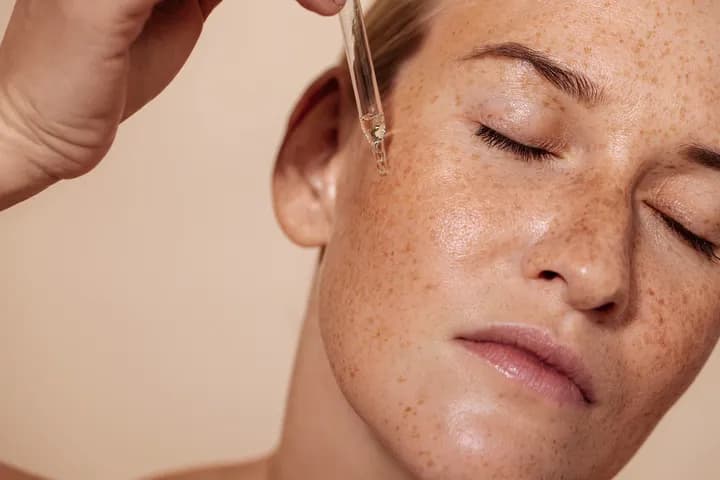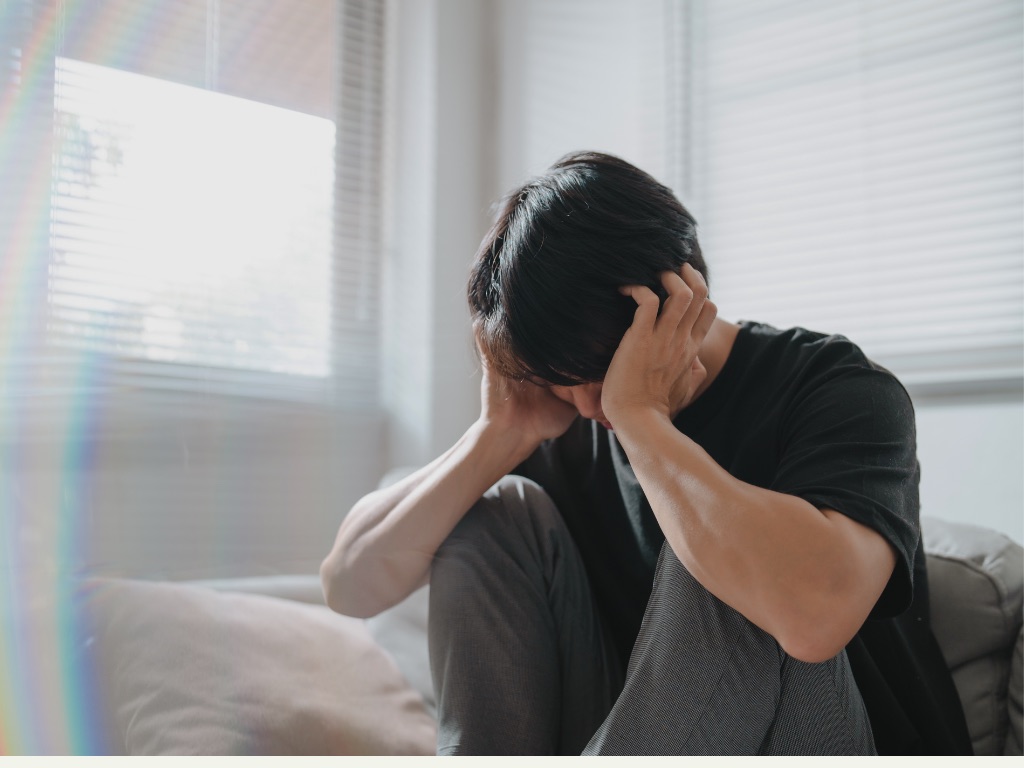Many men don’t realize that, just like women experience menopause, men can face a similar phase called andropause. The words "pause" and "andras" are Greek terms that denote "male human" and "cessation," respectively. The condition known as "andropause" 1 is associated in lower testosterone levels and is linked to a decrease in sexual fulfillment or overall well-being.
Low testosterone production can be mitigated with TRT, potentially restoring optimal hormone levels. Don’t let low testosterone slow you down. With safe, tailored TRT solutions, Vita Bella helps men over 40 boost stamina, energy, and confidence so you can feel stronger at every stage of life.
How is “male menopause” different from “female menopause”?
Both men and women experience hormonal changes as they age. But this topic is still debatable: whether these hormonal alterations are comparable to menopause. There are multiple effects and outcomes of hormonal changes 2.
Men's testicular hormone activity is maintained until old age, whereas women's ovarian hormone function gradually decreases with the loss of reproductive potential. Also, there are ongoing and somewhat individual variations in the gonadal hormone concentrations in men with regard to the decline in testosterone levels.
Furthermore, andropause typically occurs gradually, primarily between the ages of 40 and 55, and its causes are more problematic because there are no precise evaluation standards available. Andropause is said to happen in males after the age of 50.
Whereas menopause happens in an earlier age range (often beyond the age of 48) and affects women more than it does men. Early hormonal changes in women, even after the age of 40, cause the gonads' ovulatory function to stop functioning, which has significant adverse effects on health.
Symptoms of Low Testosterone in Men
Symptoms include erectile dysfunction, loneliness, mood swings, irritability, exhaustion, weakness, decreased libido, increased body fat, and decreased bone density. Worldwide data 3 indicate that over 480,000 men over 40 experience andropause, with the severity and extent of the shift gradually changing over time. As per research, male menopause might be mild, moderate, or severe.
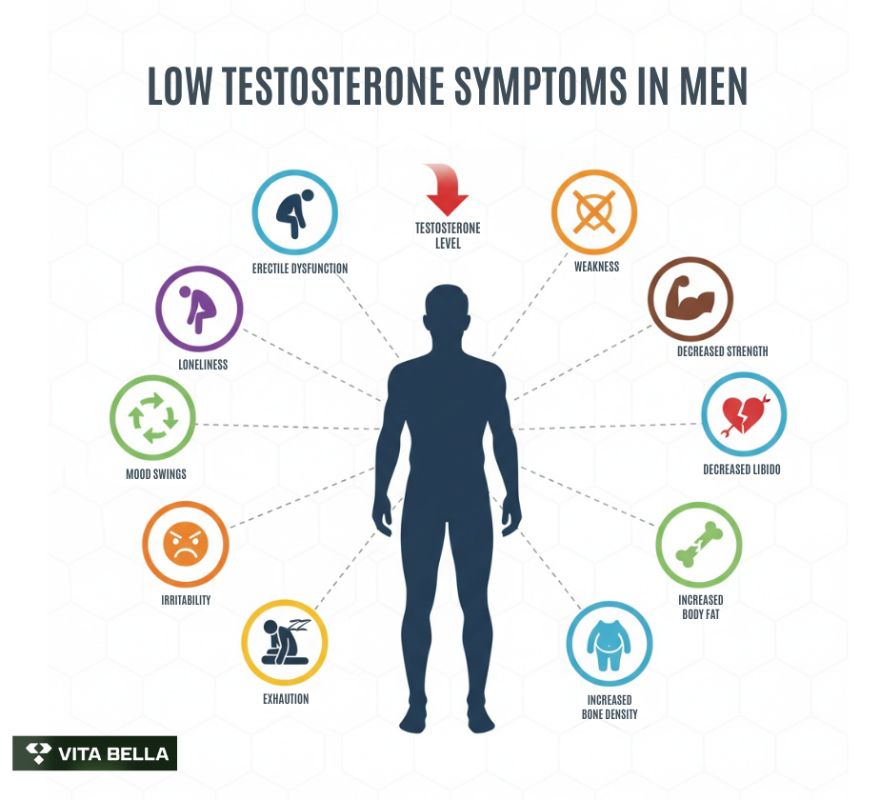
Is “Male Menopause” Real or a Myth?
Earlier schools of thought viewed age-related declines in testosterone as an unavoidable aspect of male biology something to be accepted rather than addressed. However, this belief is more myth than fact4. The most effective approaches involve increasing public awareness, implementing preventive strategies, and, when appropriate, utilizing medical therapies. Common misconceptions include:
Penile erection is a sensitive indicator of male sex drive and sexual arousal.
For a fulfilling sexual experience, it is often believed that the penis must remain fully erect throughout the entire encounter.
Penile erection and ejaculation are closely interconnected.
An erection is sometimes expected to occur “instantly” or “in the blink of an eye.”
The quality of sexual activity is often assumed to depend solely on the partner.
Aging does not occur in isolation; it is typically accompanied by multiple health conditions.
Health Risks of Ignoring Low Testosterone
In addition to variable symptoms, low testosterone levels can lead to several complications5, including cardiovascular diseases, metabolic changes, and osteoporosis.
Research analysis of studies 6 on the impact of hypogonadism in adult men found significant evidence linking the condition to sexual dysfunction and cognitive decline. They also found some data linking the condition to signs of depression, bone fractures, and mortality. Untreated hypogonadism can possibly be a risk factor for development of coronary artery disease, stroke, and all-cause mortality.
Benefits of TRT for Men Over 40
The most commonly reported advantage that males linked with TRT was increased energy 7, which was the third most common defined reason for getting testosterone therapy (in about 28.6% of men).
Some of the complications of hypogonadism can be addressed by using TRT to bring testosterone levels back within the normal range. Sexual function, lean body structure and muscle strength, erythropoiesis and bone mineral density (BMD), cognition, and potential improvement in cardiovascular risk factors are among the most significant of these.
Other positive effects include those on mood, mental clarity, and patients' sense of overall health.
It has also been demonstrated that TRT increases libido 8, frequency of sexual activity, and better erections, and overall improves sexual function.
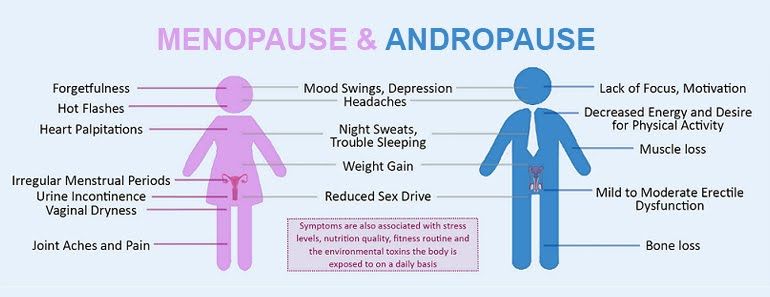
Your Best Years Aren’t Behind You Restore Them with Vita Bella TRT
Struggling with fatigue, low energy, weight gain, or a fading sense of confidence? Many men over 40 silently battle these symptoms without realizing they stem from low testosterone. Ignoring the signs only makes them worse, holding you back from the strength, focus, and healthy lifestyle you deserve.
That’s where Vita Bella makes the difference. Our expert-guided, personalized TRT programs are designed to safely restore testosterone levels and help you feel like yourself again. With medical precision, ongoing support, and proven results, Vita Bella gives you more than treatment, it gives you back your edge, your power, and your confidence to thrive at any age.
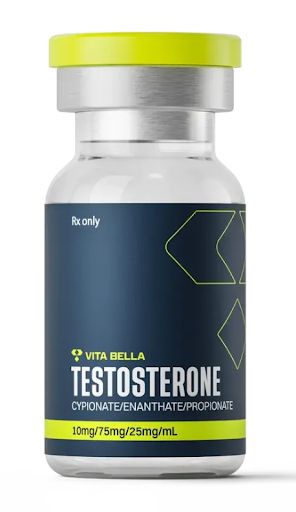
FAQs
Do men really go through menopause like women?
Not exactly. Men don’t experience a sudden hormone drop like women do during menopause. Instead, testosterone levels decline gradually with age, a condition often referred to as andropause or “male menopause.”
What are the most common symptoms of low testosterone in men?
Low energy, decreased libido, erectile dysfunction, mood changes, loss of muscle mass, and weight gain are among the most common signs of low testosterone in men over 40.
Can testosterone replacement therapy (TRT) help every man with low testosterone?
TRT can be highly effective, but it’s not right for everyone. A healthcare provider must run tests and assess risks before recommending therapy to ensure it’s safe and beneficial.












